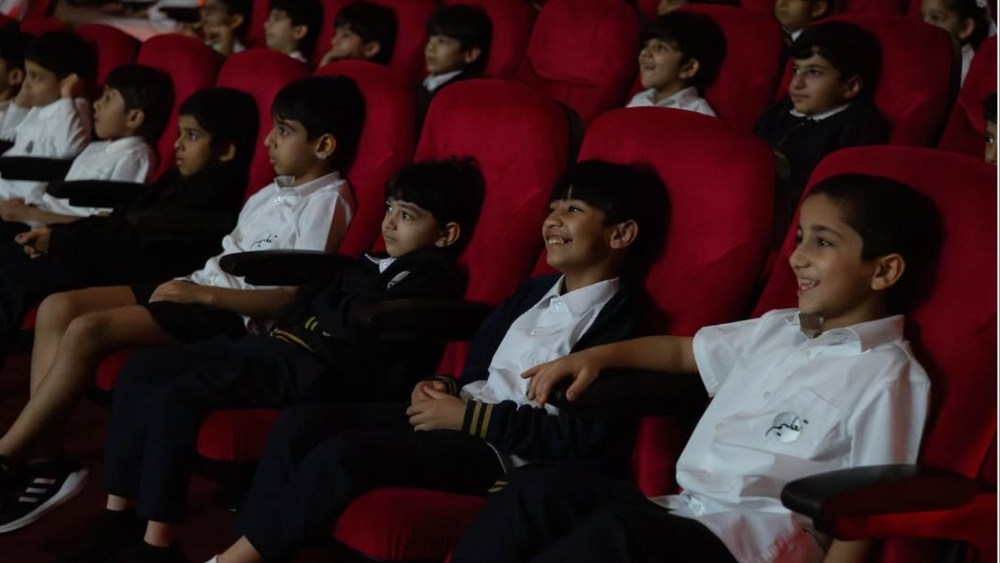A Festival With Heart and Purpose, Rooted in Youth Voices
When the 12th edition of the Sharjah International Film Festival for Children and Youth rolls out its green carpet on Oct. 6, it won’t be chasing star power or celebrity glitz. Instead, under the leadership of Sheikha Jawaher bint Abdullah Al Qasimi, the festival has built a reputation as a platform with “a heart and purpose,” driven by education, cultural exchange, and a commitment to amplifying young voices.
Launched in 2012 at the behest of Her Highness Sheikha Jawaher bint Mohammed Al Qasimi, wife of the Ruler of Sharjah, the festival began as the first event in the Gulf dedicated exclusively to children’s cinema. The director recalls, “People were not so aware that there were different types of children’s films. There are documentaries, there are shorts, different kinds of animation.”
She stresses that the vision was always distinct from other regional showcases. “Her Highness envisioned a festival with a different purpose,” she explains. “It’s rooted in education, culture, and inspiration for the children and the youth.”
From a starting point of mainly screenings in its debut year, the festival has steadily grown into a multi-venue event with panels, workshops, and thousands of submissions. “Now, we have around 100 guests, filmmakers, directors, and celebrities coming in and sharing knowledge,” Sheikha Jawaher reflects. “We have panel discussions, we get thousands of kids coming from schools all around the UAE to attend, to watch films, and to discuss them.” Since 2013, the festival’s inception, the event has welcomed a total of 236,254 guests.
This year’s edition will showcase 76 films from 26 countries, selected from more than 1,700 submissions, including first-time participation from São Tomé and Príncipe, Ecuador, and Belize. Three Middle East premieres are slated for the green carpet, including Saudi filmmaker Sarah Talab’s “Hajeer,” Dutch animation “Miss Moxy,” and a South Korean drama from Suryeon Jung recounting the story of a 10-year-old girl isolated from the world. On the sidelines, a pop-up program will feature workshops ranging from Emirati comics to a photography and documentation tour, while panels and keynote sessions will delve into the role of cinema in shaping youth culture. Additionally, guests can attend a film market offering young storytellers a platform to pitch projects, find collaborators, and explore pathways to production
Rooted in Sharjah’s Cultural Vision
The festival reflects the emirate’s broader cultural strategy. “Sharjah has always prioritized culture, knowledge, family, and human development,” Sheikha Jawaher emphasizes. “So we wanted to be a platform where cinema inspires learning, dialogue, empowerment, and inspiration.”
That mission has given SIFF a distinctive identity in a crowded regional calendar. “We’re not here to replicate what you see in Marrakech or Cairo,” she remarks. “We’re here to nurture young voices. That’s what makes us different.”
Elevating Youth Perspectives
At the core of the programming are films both for young audiences and, increasingly, by them. “The films that we screen are for children and youth, as well as by children,” Sheikha Jawaher explains, while noting that the percentage of the programming that comes directly from children filmmakers is still modest, but steadily increasing. As it stands, they make up around 20% of the festival’s programming.
To encourage more authentic work, the festival offers feedback sessions for young applicants whose films aren’t accepted. “We need to be very transparent and very real in this industry,” she underscores. “So when we do reject some of the films, we explain what they can do to enhance the quality. We want to encourage them to submit again.”
Curation prizes originality and experimentation. “We look first and foremost, of course, for authenticity,” she states. “We also look for bold experimentation, projects that raise the bar higher and push the boundaries.”
Broadening Global Connections
SIFF has steadily widened its international footprint, increasing the number of submissions and their countries of origin year after year. That expansion has prompted Sheikha Jawaher to set a new goal: bringing in countries that have never participated in SIFF. “We want to hear stories from all the countries in the world,” she emphasized.
In its 2024 edition, the festival inaugurated the Country of Honor, with Palestine holding that distinction and programming featuring a spate of Palestinian films. She noted that media sometimes questioned whether such a choice was too polarizing. “I remember being asked in interviews, “Isn’t that too political? You’re talking about refugees. You’re talking about wars,” she recounted. “I said, ‘We’re not political. We’re talking about stories. Our kids cannot live in bubbles anymore. They need to know. They need to have a voice so they can make a difference.”
This year, South Korea will be recognized as the Country of Honor, with a strand exploring the history and philosophy of Korean cinema and its global reach.
The 2025 festival will also debut the Children and Youth Film Congress, a new forum designed to bring together filmmakers, industry professionals, and educators to exchange experiences, address challenges, and explore ways to better support youth-focused cinema.
SIFF’s jury will also feature 16 international directors and experts, among them Syrian actress Yara Sabri, known for her work in acclaimed drama series, and South Korean animation director Jae Hoon Ahn, best known for “Green Days.”
Challenges and Growth
Building awareness and fostering media literacy has been central to not only SIFF’s mission, but its growth. Still, running a youth-focused festival has not been without hurdles. “At the beginning, people thought, ‘Why are you watching films that are not English or Arabic?’” Sheikha Jawaher recalls. “With time and the boom of Korean titles, for example, more people are open to actually watching a film that’s not in their language, but still having the same feelings. The film will still make you cry, whether you understand what’s being said, whether it’s silent.”
Parents, too, sometimes resisted films that showed uncomfortable truths. She cites an instance where a mother objected to the content of a film: “She came out saying, ‘Oh my God, the film! The child in the film ate a pebble, and now my son will eat a pebble. What are we teaching our kids?’ And I smiled and I said, ‘But this is reality. We cannot sugarcoat it.’”
Ultimately, the festival’s steward affirms, such moments highlight why the festival’s educational role matters. “We cannot ban everything,” she insists. “Kids need to understand consequences, to see reality, but always framed within dialogue and discussion.”
Looking Ahead
As for the next decade, Sheikha Jawaher has an ambitious vision. By 2030, she hopes SIFF will be “a leading platform in the region for young voices where every single aspiring filmmaker in the Arab world knows they can share their work, gain mentorship, and be part of the global conversation.” By 2035, she adds, “I hope it stands as a global reference point for youth cinema. My dream is that the filmmakers who started their journey at the film festival will return as mentors.”
For her, the personal journey has been just as transformative. “It’s taught me that young people have incredible depth of imagination and resilience,” she reflects. “When given the chance, they tell stories with honesty, courage, and creativity. It reminded me that storytelling is about identity, connection, and hope. The youngest voices often carry the most powerful truths.”
That, ultimately, is the festival’s promise: to center stories too often overlooked, and to do so with sincerity. “It gives us a uniqueness,” she affirms. “We are a festival with a heart and purpose.”

